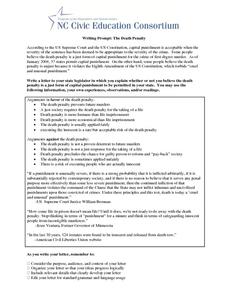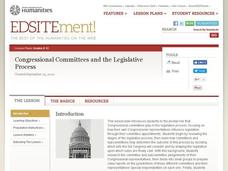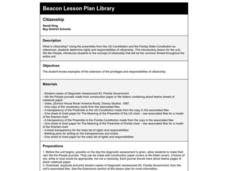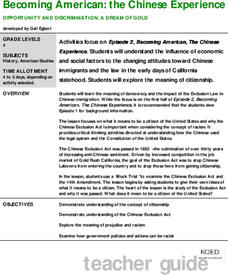C3 Teachers
Black Genius: How Did Black Genius Help Build American Democracy?
"How did the slavery system undermine the United States' democratic principles?" This question launches a study of how the Preamble to the Declaration of Independence, Article I, Section 2 of the U.S. Constitution, and Article IV,...
Carolina K-12
Writing Prompt: The Death Penalty
Is the death penalty unjust because it violates the Eighth Amendment of the United States Constitution, "cruel and unusual punishment"? Or is it just a form of permissible capital punishment? After weighing arguments for and against the...
State Bar of Texas
Marbury v. Madison
Who has the final say in matters dealing with the rules under the United States Constitution? The case Marbury v. Madison brings to light the issue of judicial review. Learners investigate the Supreme Court's opinion in the case with a...
National Endowment for the Humanities
The Declaration of Independence in Six Parts
Everyone knows that the Declaration of Independence is important, but what does it actually say? Members of American history classes analyze the Founding Fathers' arguments against British tyranny and for a more perfect union with a...
DocsTeach
The 19th Amendment and the Road to Universal Suffrage
Your vote matters! An informative activity focuses on the Nineteenth Amendment and explains how it paved the way for universal voting rights. Young historians analyze several documents and a complete a worksheet, describing the impact of...
Anti-Defamation League
The Road to Brown
As part of the study of segregation in U.S. schools, scholars research and create a timeline of events that led to the historic Supreme Court case, Brown V. Board of Education. Groups research a topic or event that led to the decision,...
iCivics
Mini-Lesson: Executive Orders
Can the President of the United States pass a law all by himself? Scholars investigate the concept of the executive order in regards to the powers of the presidency. They use current issues and events to monitor media bias while also...
Teaching Tolerance
Using Photographs to Teach Social Justice | Confronting Unjust Laws
The right to peacefully assembly to protest injustice is a key element of the First Amendment to the United States Constitution. Class members are asked to analyze two photographs of people confronting what they consider to be unjust...
Curated OER
Congressional Committees and the Legislative Process
Students consider the importance and influence of congressional committees. They research congressional committee assignments, jurisdictions and responsibilities as illustrations of the basic principles of American federalism.
Curated OER
Preserving Democracy
Students read excerpts of the Declaration of Independence and United States Constitution. Using the documents, they identify the ideas of how the government should be run. In groups, they develop a skit that encourages people to be...
Curated OER
Building the State (1781-1797)
In this online interactive history activity, students respond to 9 short answer and essay questions about the vision of the Republicans and the Federalists.
Curated OER
Citizenship
Fifth graders read the preamble of the U.S. and Florida Constitutions. They discuss vocabulary definitions surrounding the concept of citizenship. They discuss and write about the rights and responsibilities of citizens and apply their...
Curated OER
ONE VOTE
In order to understand the political process and the importance of voting, pupils will construct a class time line. They will group up and research a specific era, creating a time line of political events where one vote made a...
Curated OER
Understanding The Preamble
Students explore the Preamble of the U.S. Constitution. In this government lesson, students write a preamble to encourage cooperation in their classroom as they study the Preamble of the U.S. Constitution.
Curated OER
Opportunity and Discrimination, A Dream of Gold
Young scholars focus on what it means to be a citizen of the United States and why the Chinese Exclusion Act is important when considering the concept of racism.
Curated OER
The Bill of Rights
Seventh graders determine why the Bill of Rights was added to the Constitution. For this U.S. government lesson, 7th graders discuss the first 10 amendments and any vocabulary they may be unfamiliar with. Students then read different...
Curated OER
Democracy: An Introduction.
Learners study the U.S. Constitutional System and how it compares with forms of democracy that developed in ancient Greece and Rome. They list and explain the requirements it takes to form a society to be considered a nation.
Curated OER
History Biographies
Students explore the life and the contributions of five people from U.S. history in the five lessons of this unit. james Madison, Dolly Madison, Sequoyah, Harriet Tubman, and Clara Barton are presented to students for exploration and...
Curated OER
Bill of Rights
Students are introduced to the Bill of Rights. After their introduction, they interview adults about the rights and create a list of them in their own words. They graph the results and analyze them and share their conclusions in a...
Curated OER
1900 America: Primary Sources and Epic Poetry
Using Walt Whitman's Song of Myself and Hart Crane's The Bridge as models, class groups first craft their own epic poems for 1900 and, using primary sources, create a multi-media presentation that captures the sights and...
Curated OER
After: A Study of Individual Rights
Use the dystopian novel After by Francine Prose to spark discussion about individual and student rights. Learners read the novel, evaluating how far a school can go to control its attendees. As they read, scholars...
Curated OER
History Mystery Message Challenge
Eleventh graders examine the US Constitution. In this American Government lesson, 11th graders gather the history and government facts to solve the history message.
Curated OER
Why Do We Separate Power?
Students investigate the separation of powers that are outlined in the Constitution. The lesson includes essential questions that are used to guide the research. The information is used to increase knowledge of how power is used in...
Digital History
The Whiskey Rebellion
Can you imagine an army of 5,000 rebels prepared to march against the United States government over...whiskey? This is exactly what happened in 1794, and your young historians will be fascinated to read about the events that led up to...
Other popular searches
- United States Constitution
- United Statesusus Constitution
- The United States Constitution
- Unites States Constitution

























